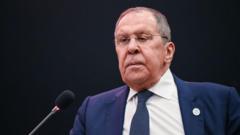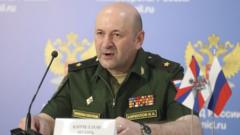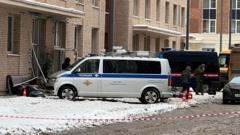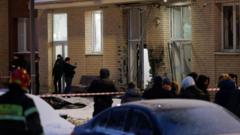The tensions surrounding Lavrov’s presence at the summit reveal deep divides regarding Russia’s actions in Ukraine and the geopolitical landscape in Europe.
First EU Visit from Lavrov Amid Controversy and Tensions

First EU Visit from Lavrov Amid Controversy and Tensions
Russian Foreign Minister Sergei Lavrov attends a European security summit in Malta, marking his first visit to an EU state since the invasion of Ukraine.
Sergei Lavrov, Russia's Foreign Minister, has made headlines by attending a security summit in Malta—his first visit to an EU country since the start of the full-scale invasion of Ukraine in 2022. This controversial trip to the Organization for Security and Cooperation in Europe (OSCE) has ignited strong reactions, particularly from Ukrainian officials.
Andriy Sybiga, Ukraine's foreign minister, walked out of the summit hall prior to Lavrov's address, labeling him a "war criminal" and expressing that Russia's participation in the OSCE contradicts the organization's founding principles aimed at fostering peace and cooperation in Europe. In his addressed remarks, Lavrov remarked that the West is escalating tensions, alleging that it is igniting a new Cold War and risking it evolving into direct conflict.
Amid the summit's proceedings, critical voices also emerged from the United States. Secretary of State Antony Blinken accused Russia of perpetuating aggression in Ukraine while disseminating vast misinformation. He asserted that the current conflict has never been about Russia's security, but rather about President Putin's ambitions to erase Ukrainian sovereignty. Despite the high-profile attendance of both Lavrov and Blinken, direct dialogue between the two is not anticipated.
The OSCE meeting highlights continuing divisions over Russia's role, as Kyiv had opted to boycott last year’s assembly in North Macedonia mainly due to Lavrov’s expected attendance. This year's gathering also saw numerous diplomats leave in protest before he spoke.
Moscow’s criticisms of the OSCE are increasing, with Lavrov previously alleging that the organization is becoming a tool for NATO and the EU, thereby compromising its original mission to mediate East-West relations. Russia has further distanced itself from the OSCE by halting participation in associated parliamentary activities, calling them biased against its interests.
Before the Malta summit, Russian foreign ministry spokesperson Maria Zakharova indicated Lavrov would voice dissent against what she termed the "institutional crisis" within the OSCE, suggesting that Western member states exploit the organization for their preconceived agendas. Notably, in a twist, the Maltese foreign ministry declined to issue a visa to Zakharova, citing objections from multiple OSCE member nations, reinforcing the fraught geopolitical atmosphere.



















